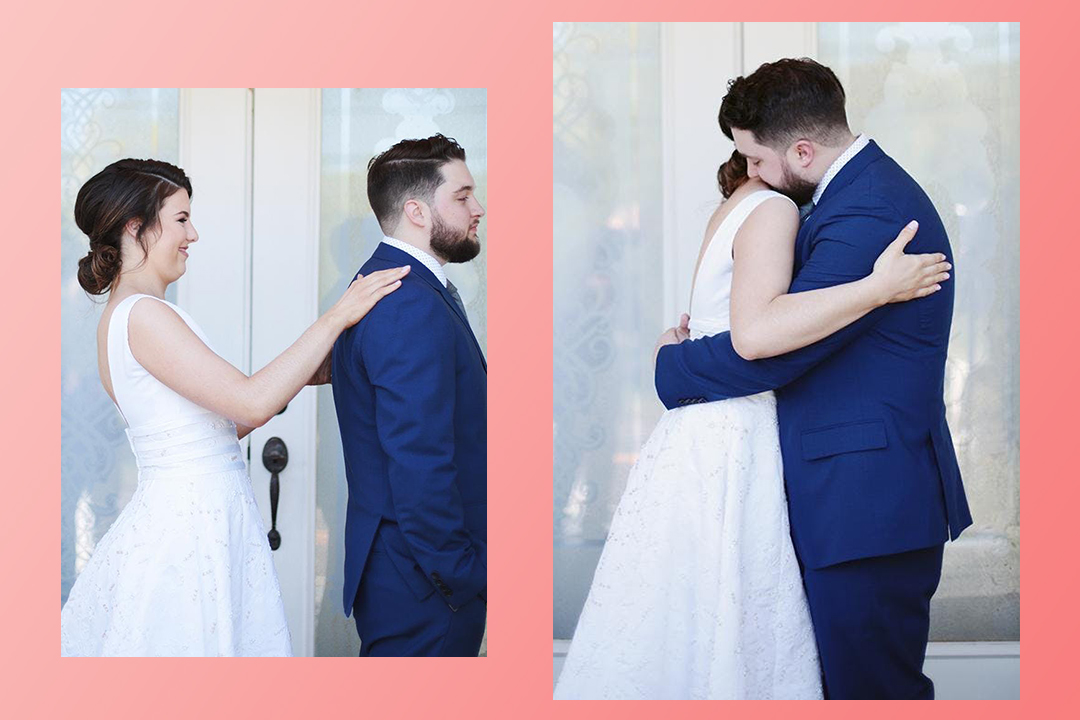- Expert advice/
- Wedding planning 101/
- Legal/
- How to Get a Marriage License in Texas
- Legal
How to Get a Marriage License in Texas
If you’re celebrating your love in the Lone Star State, here’s everything you need to know about getting a Texas marriage license!
Last updated February 5, 2024

The First Look ✨
- All Texans must submit a marriage license application to the local county clerk’s office, either in-person or online. Marriage license fees typically cost between $72 and $88 in Texas.
- Couples must also submit photo ID, a copy of their birth certificates, their social security numbers, and proof of address.
- Couples and their officiant can sign the marriage license either before, during, or directly after their ceremony. From there it will be filed with the county clerk to obtain a marriage certificate.
- Texas couples should also take time to think about their choice of venue, vendors, and wedding style—and Zola makes it easy to find the perfect match for all your nuptial needs.
From the warm sands of the Gulf Coast to the vast beauty of the Great Plains, Texas is the perfect place for any type of wedding. While finding your picturesque venue is easy with Zola’s wedding vendor list, figuring out the paperwork for your wedding is often more difficult.
That’s why we’ve created this helpful guide on getting a marriage license in Texas. If you’re looking to make your love official—and legally recognized under Texas law—read on for everything you need to know.
Application Procedure
All soon-to-be spouses must submit an application in order to receive their marriage license. This marriage license application should be given directly to your local county clerk’s office. While all counties offer in-person application appointments, many others allow this process to be done online.
In Texas, there is a 72-hour waiting period between obtaining a marriage license and holding a wedding ceremony. Couples can avoid this waiting period under certain circumstances, such as:
- Completing a premarital education course, known as Twogether Texas.
- Obtaining a written waiver from a judge.
- Remarrying a previous spouse.
For military service members, a notarized absentee affidavit may be submitted in place of an in-person appointment. The 72-hour waiting period is also waived for all military members and their significant others.
Application Requirements
Every state will have a unique set of requirements for obtaining a marriage license. In Texas, couples will need to provide the following documents with their marriage application:
- Photo identification for both parties
- A certified copy of your birth certificates
- Your social security numbers
- Proof of address
If one or both parties are remarrying, additional documents will be required. A divorce decree, annulment paper, or death certificate will act as sufficient proof that any prior marriages have ended. In the event of divorce, Texans must wait at least 30 days until they can apply for another marriage license. This waiting period will be waived if the applicants are remarrying each other.
Couples must also pay a marriage license fee along with their application. In Texas these fees will range from $72 to $88, depending on the Texas county.
Once they have received their marriage license, Texas couples will need to hire an officiant who can legally sign off on the union. In Texas, officiants may be:
- Religious officers, such as a minister, rabbi, or imam
- Justices, judges, or magistrates from a Texas state court
Things to Know About Your Texas Marriage License
In addition to the application process, there are a few other things that Texas couples should know about marriage licenses:
-
The Wait – Couples can expect to receive their marriage license at least 72 hours after applying, if not longer. From there, you will have 30 days following the ceremony to return your signed license to the county clerk.
-
The Expiration Date – After obtaining a marriage license, Texans have a grace period of 90 days to hold their marriage ceremony and officiate the marriage. This is the standard time period that most US states allow a marriage license to remain valid. This is why it’s best to leave this as the final step on your wedding checklist.
-
The Ceremony Location – Even with a Texas marriage license, it’s important to note that your ceremony does not have to take place in Texas. Your license will typically remain valid in another state or country, so Texans can feel free to plan their dream destination wedding (and you can find pre-screened vendors across the nation with Zola’s wedding vendor database).
-
Testing – Texans are not required to take a blood test prior to getting married. In some states, a blood test for various diseases is required prior to issuing a marriage license, but many areas of the US are abandoning this outdated practice. Fortunately, Texas is one of them.
-
Application Time Frame – Due to the specific timeline requirements, Texas couples will need to find a sweet spot when applying for a marriage license. We recommend submitting your application about a month prior to the ceremony date. This will leave plenty of time for the county clerk to process and approve your request, without leaving much time for your license to expire.
-
Use It or Lose It – As we mentioned before, a Texas marriage license is at risk of becoming invalid 90 days after it’s issued. In addition to this rule, there are some other reasons why a marriage license may be invalid in this state. The following reasons may void a marriage license both before and after it’s been officiated:
-
A putative marriage (where one party is coerced into the union based on falsehoods)
-
Bigamy or polygamy
-
One or more parties are under 18 years of age
-
Incest or former stepparent/stepchild relationship
Marriage Laws Unique to Texas
Every state has their own laws regarding marriage. While many of these laws are fairly straightforward, others may be lesser known by the general public. To help you navigate the complicated world of being wed, we’ve compiled a list of the Texas marriage laws that everyone should be familiar with:
-
Marriage by Proxy – Texas is one of the few states that allows marriage by proxy. This refers to a marriage ceremony where either one or both parties are not actually present. Instead, a stand in will act on the individual’s behalf during the ceremony. Marriage by proxy is only allowed for active duty service members in the state of Texas.
-
Incarcerated Ceremonies – Prior to 2013, the marriage by proxy law in Texas also applied to incarcerated individuals. However, now Texas inmates are required to hold their wedding ceremonies on Texas Department of Criminal Justice (TDCJ) property. In simpler terms, incarcerated Texans must attend their weddings in-person at their correctional institute.
-
Age Limits – The legal age of marriage in Texas is 18 years old. Individuals aged 16-17 years old may obtain a marriage license only if parental consent is given. Those under the age of 16 may obtain a marriage license if judicial consent is given via a court hearing—although these circumstances are rare. Any officiant who conducts a marriage with a minor that lacks these permissions will be subject to third degree felony charges.
-
Common-Law Marriage – Texas is one of only nine U.S. states that recognizes common- law marriage. Common-law marriage is an informal, but legal route to making it official with your spouse. In Texas, a common-law union may be proven based on three principles:
-
The parties have agreed to be married.
-
After this agreement, the parties have lived together in this state of spousehood (the length of time the couple has lived together does not need to be specified under Texas law).
-
The couple has represented to others that they are married.
Frequently Asked Questions About Marriage in Texas
We get it, all these rules and regulations can be a little confusing. Even with the information available, it’s reasonable for Texas couples to have some questions. That’s why we’ve compiled a handy FAQ list to provide the answers you’re looking for:
Why Is There a Waiting Period for a Texas Marriage License?
It can be frustrating to wait for your marriage license, especially knowing that many other states do not impose a waiting period. For this reason, Texans may be wondering why a waiting period is required at all.
The bottom line is that many of the laws regarding marriage licenses are designed to diminish the likelihood of divorce. This is why couples who complete a premarital education course are able to bypass the waiting period.
What Is the Difference Between a Domestic Partnership and a Marriage?
These two types of relationships can often be confused with one another, due to their similarities. It’s important to note that couples engaged in domestic partnerships do not present themselves to others as married. Instead, these couples prefer to remain unmarried while reaping some of the benefits of a marital union. Some of these benefits include:
- Shared health insurance benefits
- Tax exemptions
- Pension benefits
- Bereavement leave
- Visitation rights for hospitalization or incarceration
The process of ending a domestic partnership may also resemble a traditional divorce, as property and assets are often split up. A common law marriage, however, will typically have a lengthier divorce process and more legal benefits than a domestic partnership.
Does Texas Recognize Domestic Partnerships?
So, we know that Texas recognizes common-law marriages, but what about domestic partnerships? Here’s the 411 on this tricky legal matter.
Statewide, domestic partnerships are not recognized under Texas law. That being said, certain counties and cities in Texas do recognize the legal benefits of this partnership, including:
- Travis County
- Austin
- Dallas County
- El Paso
- Fort Worth
- San Antonio
- Bexar County
Is a Marriage Certificate the Same Thing as a Marriage License?
Marriage licenses and marriage certificates are two very different documents. While a marriage license is obtained prior to the wedding, a marriage certificate is given out after the ceremony. Essentially, a marriage license is designed to give couples the ability to wed, and later keep a government record of the marriage. A marriage certificate, on the other hand, is kept by the couple for their marriage record.
What to Do After You Get Your Marriage License
Once you’ve secured your marriage license, the fun part can finally begin. Getting this step out of the way will allow couples to look forward to their wedding day, wrap up the planning with Zola’s free wedding websites, and begin the process of finalizing their commitment to one another.
-
Keep It Somewhere Safe – When the county clerk issues your marriage license, you’ll want to make sure that it’s kept in a safe, secure place until the wedding day arrives. It’s vital that this document arrives at the ceremony venue on time and undamaged.
-
Make Sure It Gets Signed by the Right People – Your officiant will fill out several different parts of the marriage license, leaving only the signature lines for you and your spouse to fill out. This may be done before, during, or shortly after the ceremony. In Texas, a witness is not required for a wedding ceremony—so the only people signing this document are the couple and their officiant.
-
Deliver It Back to the County – As previously mentioned, you have a 30-day grace period to file your completed marriage license with the county clerk. In many cases, the officiant will complete this step on behalf of the couple.
Getting Married in Texas: Everything Else You Need to Know
Texas is a popular wedding destination for locals and out-of-staters alike. From beautiful wedding venues to affordable vendors, it’s no surprise that so many people flock to this southern hotspot for their big day.
Of course, weddings are about more than just a piece of paper. It’s important to not only figure out the logistics of your marriage license, but also the way you’ll be celebrating this milestone. That’s why at Zola we want to share some of our favorite tips, tricks, and advice to help you plan the best Texas wedding possible. Here’s what you’ll need to know:
-
Weather – Texas summers are serious business, and couples planning an outdoor wedding during this time should keep a few things in mind. Consider opting for a covered outdoor space, or a venue that offers both indoor and outdoor areas. Evening weddings may offer more comfortable temperatures during the warmer months, too. Although late spring to early fall is typically peak wedding season, couples in southern states have more flexibility when it comes to dates—given that the warmer seasons last longer than other parts of the country.
-
Vendors – Speaking of peak wedding season, the time of year is also an important factor in choosing your vendors. Couples planning a ceremony and reception will have quite a few vendors they’ll need to select, including caterers, musicians, and florists. If you’re planning a wedding during peak season, or you happen to live in one of Texas’ busier metropolitan areas, we recommend searching for vendors at least one year in advance.
-
Venue – They save everything is bigger in Texas, and your list of venue options is here to prove it. From rustic barns to modern hotels, Texas has a vast array of venues that will make the perfect backdrop for any wedding style. Of course, it’s important for couples to understand exactly what their style is. Common themes for Texas weddings include bohemian, botanical, and whimsical designs. Other traditions that Texas weddings are known for include serving a groom’s cake (usually chocolate), having bridesmaid’s sport cowgirl boots, and stocking the bar with local beers such as Shiner Bock and Saint Arnold.
-
Changing Your Name – Not everyone opts for the post-wedding name change. However, if you’re planning on swapping your surname, it’s important to familiarize yourself with the process—specifically in the state of Texas. Couples can use their completed marriage license as proof in order to change your name at the social security office. This is where you’ll fill out an application for a new social security card, in order to update your last name to your liking. After you’ve hit the social security office, you’ll want to make a few other stops on the way home, specifically: the DMV, the bank, and your place of employment. These are typically the most common institutions that will need to be informed on the changes to your last name.
Zola: Taking the Guesswork Out of Wedding Planning
While this may seem like a lot of information, the truth is that you really can’t go wrong with a Texas wedding. The combination of warm weather, beautiful landscapes, and some good, old-fashioned, southern hospitality is sure to make your special day a success. Just remember to bring your marriage license.
Here at Zola we’re all about making your wedding easier. The planning process can be intimidating for many people, especially those who have little experience in the world of weddings. That’s why we’ve made it our mission to modernize wedding planning.
How do we do this? It’s simple. Our online wedding planning tools are designed to take the guesswork out of wedding planning, so all you have to worry about is the creative choices. When couples use our free wedding websites, they can add tons of helpful features to keep everything organized and accessible. From online gift registries to digital guest lists, Zola users can manage every step of the planning process with the click of a button.
Zola also offers expert wedding advice directly on the website, so couples never have to feel confused or lost during this complicated process. From marriage license logistics to choosing a wedding style—and everything in between—the experts at Zola have you covered from start to finish.
Leave the stress behind and start planning your wedding the modern way, at Zola.
Up next for you

Getting Married in Dallas, TX: A Complete Guide
How-To
Are you getting married in Dallas? Our guide covers everything you need to know to plan the wedding of your dreams, from Texas marriage license info to local venues and more.

The Complete Guide of Wedding Flowers by Season
Wedding Style
Incorporating seasonal flowers into your wedding day gets you the best quality blooms for a lower price tag. This guide can help you save big on your floral budget, no matter what time of year you plan to tie the knot.

Top 15 Places to Go to For a Bachelorette Party
Inspiration
Planning a destination bachelorette party? Check out these ideas for the ultimate girls trip before you say “I do.” Read on to get inspired.

Best Bachelor Party Destinations
List
Looking for the best bachelor party destinations? Zola experts are here to help! Here is a list of great bachelor party destinations to help you kick-start your celebration planning.
Featured

All-Inclusive Wedding Venues: Pros and Cons
Advice
All-inclusive wedding venues provide essential services, thus reducing your need to vet and book wedding vendors. Is all-inclusive right for you? Find out here.

Hotel Wedding Pros and Cons
Advice
Hotel wedding venues have been popular for decades. This expert guide will break down the benefits and downsides of a hotel wedding.

When Should I Book My Wedding Venue?
Advice
The engagement proposal was a success. The wedding journey is set in motion. First major step? Booking the venue. Learn about when to book a wedding venue.

50+ Ideas You Need to Include On Your Wedding Photo Shot List
List
Your wedding photo shot list is basically a checklist for your wedding photographer. Don't forget any of those special moments with our complete guide to your wedding photo list.
- Expert advice/
- Wedding planning 101/
- Legal/
- How to Get a Marriage License in Texas
Find even more wedding ideas, inspo, tips, and tricks
We’ve got wedding planning advice on everything from save the dates to wedding cakes.
